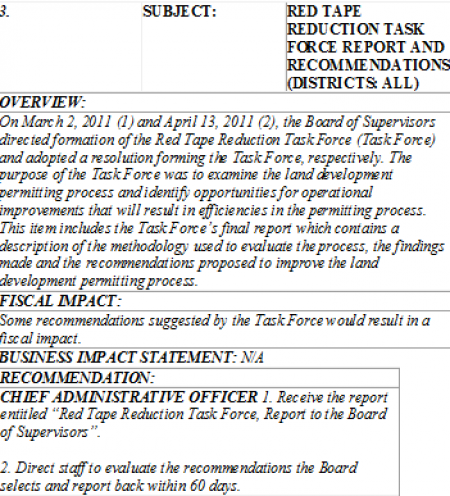Supervisors accused of approving items not on agenda regarding cutting red tape for development projects
 By Terry Francke, General Counsel, Californians Aware
By Terry Francke, General Counsel, Californians Aware
January 20, 2012 (San Diego)--Californians Aware has filed suit against the San Diego County Board of Supervisors, challenging its decision at a meeting last month as a violation of the Ralph M. Brown Act, the state’s open meeting law for local government.
The petition, filed today in San Diego County Superior Court, cites the Board’s immediate approval of a slate of recommendations from an advisory committee on cutting red tape in development approvals.
The staff-written posted meeting agenda recommended only accepting the report and directing staff to give further study to unspecified proposals, but a staff list distributed to the Board but not the public at the meeting highlighted a number of proposals for immediate action—which the Board approved, to the surprise of both observers in the audience and others who did not attend the meeting, reading the agenda to mean no action would be taken.
The CalAware suit seeks court nullification of those approvals, a declaration that the hidden agenda approach violated the Brown Act, and an order to the Board to cease the practice in the future. The litigation was prompted by the Board’s rejection of CalAware’s demand for cure and correction, which read as follows.
Californians Aware demands that the Board cure and correct a substantial violation of the Ralph M. Brown Act, namely the peremptory approval of a number of proposals in the report of the
“Red Tape Reduction Task Force” at its December 7, 2011 meeting contrary to the expectation created by the agenda that the report would be received and some proposals would be referred to staff for study.
The agenda item stated, in its entirety:

In contrast, you and you alone—not members of the public present at the meeting—were provided with a selectively highlighted version of the Task Force recommendations slugged “Possible recommendations staff can implement on 12 7.pdf.”
This cheat sheet advised you, “Should the Board direct us to do so, County staff would be able implement the highlighted recommendations now.
“For those not highlighted, staff requests 60 days to evaluate those recommendations and return to the Board. ”
You adhered to this script and caught the public completely off guard. Relying on the agenda listing and without benefit of the highlighted prompting, citizens had no way of knowing not only that selected recommendations would be referred for further staff review but that others would be given immediate effect.
The public was entitled to be alerted to this dual prospect by the agenda. Instead the agenda left the impression that a report would be received and some recommendations would be referred for further study—period.
Whether this effect was the result of administrative miscues or deliberate duplicity is, for purposes of the Brown Act at any rate, beside the point. Government Code Section 54954.2 requires only that agendas list “a brief general description of each item of business to be transacted or discussed.” It does not require disclosure of staff recommendations. But if the staff chooses to disclose its recommendations on the agenda, it must not do so in a manner calculated to mislead.
The most settled authority on this point held that a school board’s agenda was fatally underinformative for want of a few words that would have made the trustees’ literally hidden agenda—which told only half the story—clear to the public. Carlson v. Paradise Unified School District (1971) 18 Cal.App.3d 196. Just as in that case, the agenda for Item 3 of the December 7 meeting could have given fair warning by something like the following modifications to CAO recommendation 2:
Direct staff to implement the highlighted recommendations in the Task Force report and further evaluate other recommendations the Board selects and report back within 60 days.
Accordingly, Californians Aware demands that the Board of Supervisors rescind its December 7 actions—memorialized in Minute Order 3 of that date— in directing staff to implement the specified Red Tape Reduction Task Force recommendations and set them for discussion and action on a future agenda with adequate public notice.







Recent comments